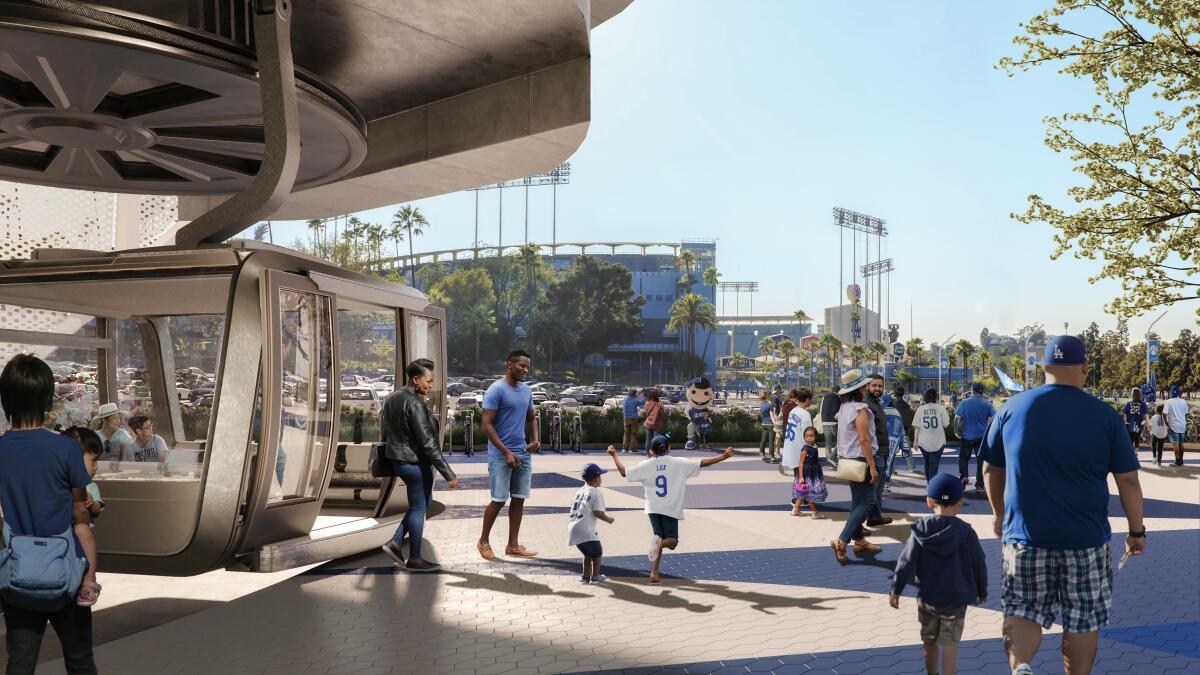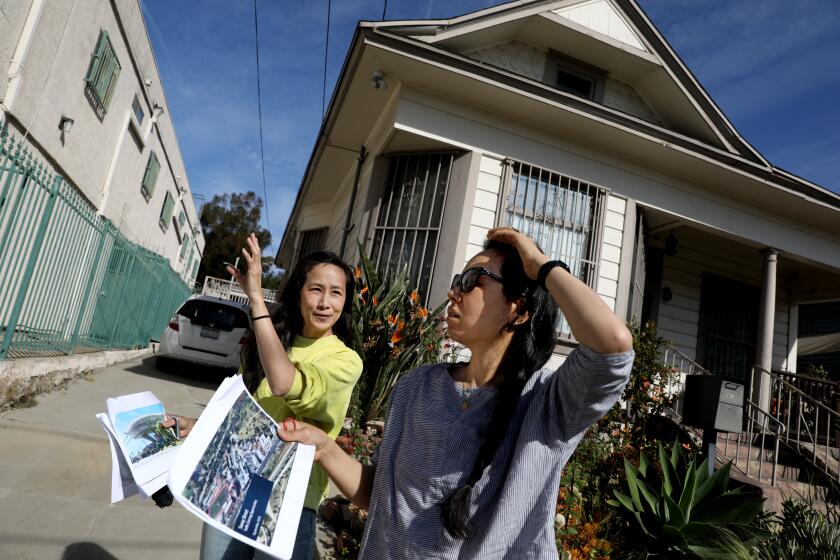Challenges loom for gondola to Dodger Stadium planned for the 2028 Olympics

With sweeping views of the Los Angeles skyline, a 1.2-mile gondola ride could be whisking tourists from Union Station to Dodger Stadium â reducing game-time traffic â by the 2028 Olympics, according to its promoters.
But the seven-minute lift that they promise would ferry up to 5,000 people an hour is facing legal challenges, and just lost one of its biggest backers â former Mayor Eric Garcetti, who championed the project on the board of the Los Angeles County Metropolitan Transportation Authority.
Mayor Karen Bass, who replaces him on the board, has yet to take a position on the the electric-powered gondola.
Chinatown neighbors and environmental groups who oppose the gondola, proposed by former Dodger owner Frank McCourt, are encouraged by Bassâ decision to rescind a last-minute move by Garcetti to light up the Hollywood sign.
âMayor Bass could come in â sheâs the new mayor in town and has a lot of appointments to the Metro board â and she could do something different than her predecessors,â said attorney Doug Carstens, who represented Hollywood homeowners in their victory.
Carstens also represents the California Endowment, a charitable group that is suing Metro over the project and asking a judge to halt it.
Superior Court Judge Mitchell Beckloff heard arguments in the case Friday. A ruling is expected by spring.
Attorneys for the California Endowment assert that Metro had a sweetheart deal with McCourtâs company Aerial Rapid Transit Technologies and failed to follow the public bidding process. They contend this is a private tourist attraction, not a public transportation line to serve Metro riders.
For its part, McCourtâs company said it did everything right.
This summer the company announced it would transfer the project to a nonprofit run by Climate Resolve. The Los Angeles-based group aims to reduce pollution related to climate change.
Gondola operations would likely be funded largely by corporate sponsorships and tourist fares, said Nathan Click, a spokesperson for the group. But the financing plan is still being worked out.
âAngelenos are hungry for zero emission transportation solutions that reduce traffic, lower air pollution, and enhance accessibility in some of our most congested neighborhoods,â Jonathan Parfrey, executive director of Climate Resolve, said in a statement. âWe will continue working in partnership with community members and all stakeholders to get this innovative project built.â
The aerial gondola proposed for Dodger Stadium sparks fears of accelerated gentrification, and a lawsuit to stop the âsweetheart deal.â
The environmental review is continuing. Next week a public meeting is scheduled at Cathedral High School, a private school that sits near the proposed gondolaâs path.
The proposal, first floated in 2018, has spurred anxieties in Chinatown.
Some residents have said they fear being pushed out by rising real estate values in a neighborhood where the median income is $36,000.
âThis did not spring from a genuine community need. This is a rich developer coming up with a project,â said Bill Przylucki, executive of Ground Game LA, a progressive political organizing group.
He said the issue appeared on the groupâs radar last year as organizers canvassed for Councilwoman Eunisses Hernandez, who represents Chinatown and Elysian Park.
âThis is really a tourist attraction. This is not going to resolve traffic issues,â he said. âWe worry about the gentrifying impacts.â
Advocates of the project say urban planners need to think more broadly for the greater interest of the region.
Joshua Schank, senior fellow at the UCLA Institute of Transportation Studies and Metroâs former chief innovation officer, said projects like these are too often derailed by âparochial interests.â
âFrom that perspective of people in the region, itâs absolutely a great project,â he said. âVery rarely do you have a project that has the potential to be iconic, serves a transportation purpose and is privately funded. Thatâs a very unusual set of circumstances.â
Schank ran an unusual department in the agency: the Office of Extraordinary Innovation, which first accepted the gondola proposal. The department takes unsolicited proposals and can turn them into Metro projects.
It created Metro Micro, the agencyâs Uber-like local service. And it ushered in a new way of seeking bids by allowing private firms to compete to design the Sepulveda Transit Corridor connecting San Fernando Valley to the Westside. Among the ideas being considered is a monorail.
The gondola was one of the unsolicited private-sector proposals that came through the office.
âIs this a project that we should allow a private funder to build? And are there some public benefits to that?â Schank said. âI think absolutely, thereâs a public benefit to it. And itâs very hard to deny from a larger, broader perspective, the public benefit is huge.â
More to Read
Sign up for Essential California
The most important California stories and recommendations in your inbox every morning.
You may occasionally receive promotional content from the Los Angeles Times.











